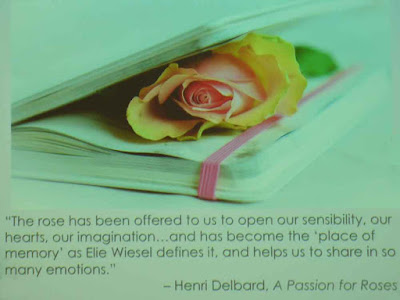.
My better half spotted this. We seem to have much in common with these people!
We love Pooh. Our kid was in choir, rather than orchestra, but it looks like we can agree about some important elements of politics. I have been known to spend some time with the Snoods (an elderly computer game). As recently as this morning..........
(The Poohs look as though it's possible their honey was fermented.......)
The 25th was just packed. There was a Smell & Tell, which I planned to attend.
It turned out that the golf course was full of a high-school tournament on the 25th. This meant my husband could go along to the Smell & Tell (rather than golfing into the night).
We decided to begin with supper at Jerusalem Garden (just around the corner from the library), and our daughter decided to join us. We had a pleasant family evening, enjoying falafel at Jerusalem Garden, and then strolling over to the library for the Smell & Tell. It was about roses..........................
Perception of chemicals in the environment is Life's oldest sense. Vastly older than come-lately senses like hearing and vision. Since Life began, billions of years ago, it has prospered through attentiveness to the scent of its environment.
Given the antiquity of smell and taste, it's not a surprise that they should be closer to the essence of being alive than newer senses. Not a surprise that they are intertwined with emotion and memory in a unique way.
Most of us walk through our days paying very little attention to our noses and the news they bring us.
Not so for Michelle Krell Kidd, whose nose has guided her since her early childhood.
Michelle, Ann Arbor's only trained Nose*, is on a mission to help all of us pay more attention to what we are smelling, and to help us practice describing the unseeable. On the 25th, her subject was roses. The history of rose cultivation, the differences between different roses, the ways humans have sought to preserve and enjoy the scent of roses, the way perfumers have used roses in the design of fragrances....
This is only the second Smell & Tell at which I have been offered tastes as well as smells. We began with rose Turkish delight. When I was a kid, I had a little round tin of those small hard candies. As an example of memory brought forward by smell/taste, I am pretty sure that my little candies tasted like the rose Turkish delight we ate on the 25th..........
We went on to smell the scent of a couple of different roses. We tasted D'Arbo rose hip jam, which is delicious. We smelled a couple of rose perfumes, and didn't have time to smell all the ones Michelle brought with her, alas.
As always, in addition to the history and culture of perfume, in addition to the active smelling, in addition to telling what those smells entice us to remember (perhaps connections to places/times/people), we also receive a lot of information on how and where to acquire the things we enjoy at a Smell & Tell.
I got some D'Arbo rose hip jam at Busch's yesterday. (Rose hips! Something new to add to my Food as Medicine repertoire for 20 different foods each day!)
If you live near Ann Arbor, and you want to expand your mind with an experience you aren't likely to find anywhere else, I encourage you to try a Smell & Tell. Michelle's connections often mean we get to smell things that basically no one else will get to smell. Each Smell & Tell is a unique venture into a place most of us don't usually get to visit. Highly recommended.
The next one is June 22, when the topic will be patchouli.
* Wikipedia: A perfumer is a term used for an expert on creating perfume compositions, sometimes referred to affectionately as a Nose (French: le nez) due to their fine sense of smell and skill in producing olfactory compositions. The perfumer is effectively an artist
who is trained in depth on the concepts of fragrance aesthetics and who
is capable of conveying abstract concepts and moods with fragrance
compositions. At the most rudimentary level, a perfumer must have a keen
knowledge of a large variety of fragrance ingredients and their smells,
and be able to distinguish each of the fragrance ingredients whether
alone or in combination with other fragrances. As well, they must know
how each ingredient reveals itself through time with other ingredients.
.
Monday, May 30, 2016
Subscribe to:
Post Comments (Atom)



















No comments:
Post a Comment